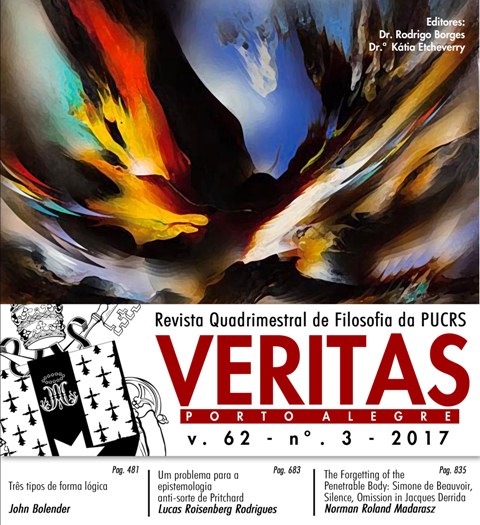An issue for Wegner’s theory about the conscious will: the Readiness Potential does not conclusively represent preparation for an action
DOI:
https://doi.org/10.15448/1984-6746.2017.3.30195Palabras clave:
conscious will, Readiness Potential, action, experience.Resumen
The role of consciousness in the production of actions has received much attention from philosophy and neuroscience. Wegner (2002) claims that what he calls the conscious will plays no role in the causal production of human actions, and that it is just an illusion. I will argue that Wegner’s claim is mistaken, because his defense of the alleged illusion rests on how he conceives of what the Readiness Potential (RP) represents in a key experiment – Libet’s experiment – and this conception is mistaken. Therefore, Wegner has not offered a convincing reason to believe that humans are deluded about the way they produce their actions.
Descargas
Citas
BAARS, B. A cognitive theory of consciousness. New York: Cambridge University Press, 1988.
BOGEN, J. E. “The illusion of conscious will: Affective or cognitive?” In: Précis of the illusion of conscious will. Behavioral and Brain Sciences, 27(5) (2004), p. 12-13. DOI: https://doi.org/10.1017/S0140525X04000159
CARLSON, S. M. “Development of conscious control and imagination”. In: BAUMEISTER, R.; MELE, A.; VOHS, K. (Eds.). Free will and consciousness: How might they work? Oxford: Oxford University Press, 2010, p. 135-152. DOI: https://doi.org/10.1093/acprof:oso/9780195389760.003.0009
CRANE, T. “Review of Mind Time by Benjamin Libet”. In: TLS, January 2005.
DEHAENE, S.; CHANGEUX, P.; NACCACHE, L.; SACKUR, J.; SERGENT, C. “Conscious, preconscious, and subliminal processing: a testable taxonomy”. Trends in Cognitive Science, 10(5) (2006), p. 204-2011. DOI: https://doi.org/10.1016/j.tics.2006.03.007
DAVIDSON, D. “Individuation of action”. In: DAVIDSON, D. Essays on Actions and Events. Oxford: Oxford University Press, 1980 [1969], p. 163-180.
DELGADO, J. M. Physical control of the mind: Towards a psychocivilized society. New York: Harper and Row, 1969.
HAGGARD, P.; CLARK, S. “Intentional action: Conscious experience and neural prediction. Consciousness and Cognition, 12(4) (2003), p. 695-707. DOI: https://doi.org/10.1016/S1053-8100(03)00052-7
HERRMANN, C. S.; PAUEN, M.; MIN, B.; BUSCH, N. A.; RIEGER, J. W. “Analysis of a choice-reaction task yields a new interpretation of Libet's experiments”. International Journal of Psychophysiology, 67(2) (2008), p. 151-157. DOI: https://doi.org/10.1016/j.ijpsycho.2007.10.013
HORGAN, T. “The phenomenology of agency and the Libet results”. In: SINNOT-ARMSTRONG, W.; NADEL, L. (Eds.). Conscious will and responsibility. Oxford: Oxford University press, 2010, p. 159-172. DOI: https://doi.org/10.1093/acprof:oso/9780195381641.003.0015
JACK, A. I; ROBBINS, P. “The illusory triumph of machine over mind: Wegner’s eliminativism and the real promise of psychology”. In: Précis of the illusion of conscious will. Behavioral and Brain Sciences, 27(5) (2004), p. 17-18. DOI: https://doi.org/10.1017/S0140525X0429015X
JO, H.; HINTERBERGER, T.; WITTMANN, M.; BORGHARDT, T. L.; SCHMIDT, S. “Spontaneous EEG fluctuations determine the Readiness Potential: Is preconscious brain activation a preparation process to move?”. Experimental Brain Research, 231(4) (2013), p. 495-500. DOI: https://doi.org/10.1007/s00221-013-3713-z
LIBET, B.; GLEASON, C. A.; WRIGHT, E. W.; PEARL, D. K. “Time of conscious intention to act in relation to onset of cerebral activity (Readiness-Potential): The unconscious initiation of a freely voluntary act”. Brain, 106(3) (1983), p. 623-642. DOI: https://doi.org/10.1093/brain/106.3.623
LIBET, B. “Unconscious cerebral initiative and the role of conscious will in voluntary action”. The Behavioral and Brain Sciences, 8(4) (1985), p. 529-566. DOI: https://doi.org/10.1017/S0140525X00044903
LOWE, E. J. Personal agency: The metaphysics of mind and action. Oxford: Oxford University Press, 2008. DOI: https://doi.org/10.1093/acprof:oso/9780199217144.001.0001
MELE, A. Effective Intentions. New York: Oxford University Press, 2009. DOI: https://doi.org/10.1093/acprof:oso/9780195384260.001.0001
NAHMIAS, E. “When consciousness matters: A critical review of Daniel Wegner’s the illusion of conscious will”. Philosophical Psychology, 15(4) (2002), p. 527–541. DOI: https://doi.org/10.1080/0951508021000042049
O’SHAUGNASSEY, B. “The will”. In: GUTTENPLAN, S. (Ed.). A companion to the philosophy of mind. Oxford: Blackwell Publishers, 1996, p. 610-17.
PANKSEPP, J. “Free will and the variety of affective and cognitive selves”. In: Précis of the illusion of conscious will. Behavioral and Brain Sciences, 27(5) (2004), p. 23-24. DOI: https://doi.org/10.1017/S0140525X04360152
PENFIELD, W. The mystery of mind. Princeton: Princeton University Press, 1975.
SCHLEGEL, A.; ALEXANDER, P.; SINNOTT-ARMSTRONG, W.; ROSKIES, A.; TSE, P. U.; WHEATLEY, T. “Barking up the wrong free: Readiness Potentials reflect processes independent of conscious will”. Experimental Brain Research, 229(3) (2013), p. 329-35. DOI: https://doi.org/10.1007/s00221-013-3479-3
SCHURGER, A.; SITT, J. D.; DEHAENE, S. “An accumulator model for spontaneous neural activity prior to self-initiated movement”. Proceedings of the National Academy of Sciences, 109(42) (2012), p. E2904-13. DOI: https://doi.org/10.1073/pnas.1210467109
SERGENT, C.; BAILLET, S.; DEHAENE, S. “Timing of the brain events underlying access to consciousness during the attentional blink”. Nature Neuroscience, 8(10) (2005), p. 1391-1400. DOI: https://doi.org/10.1038/nn1549
TREVENA, J.; MILLER, J. “Brain preparation before a voluntary action: Evidence against unconscious movement initiation”. Consciousness and Cognition, 19(1) (2010), p. 447–456. DOI: https://doi.org/10.1016/j.concog.2009.08.006
WEGNER, D. The illusion of conscious will. Cambridge: MIT Press, 2002. DOI: https://doi.org/10.7551/mitpress/3650.001.0001
WEGNER, D. “Self is magic”. In: BAER, J.; KAUFMAN, J. C.; BAUMEISTER, R. F. (Ed.). Are we free? Psychology and free will. New York: Oxford University Press, 2008, p. 227–247.
Descargas
Publicado
Cómo citar
Número
Sección
Licencia
Derechos de Autor
La sumisión de originales para la Revista Veritas implica la transferencia, por los autores, de los derechos de publicación. El copyright de los artículos de esta revista es el autor, junto con los derechos de la revista a la primera publicación. Los autores sólo podrán utilizar los mismos resultados en otras publicaciones indicando claramente a Revista Veritas como el medio de la publicación original.
Creative Commons License
Excepto donde especificado de modo diferente, se aplican a la materia publicada en este periódico los términos de una licencia Creative Commons Atribución 4.0 Internacional, que permite el uso irrestricto, la distribución y la reproducción en cualquier medio siempre y cuando la publicación original sea correctamente citada. Copyright: © 2006-2020 EDIPUCRS






